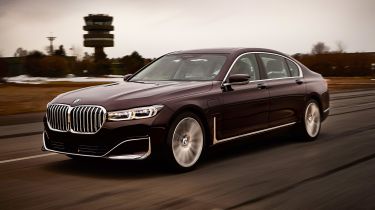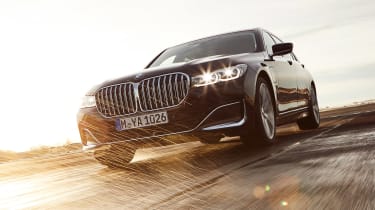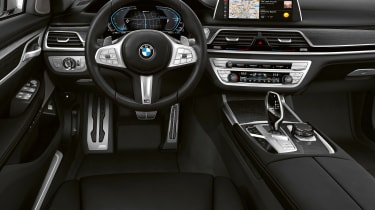BMW 745e hybrid saloon
The latest BMW 7 Series PHEV benefits from improved performance and EV driving range, making it a solid rival to the Mercedes S-Class
Pros
- Impressive performance
- Low running costs
- Undercuts the S-Class
Cons
- Polarising looks
- Slightly firm ride
- Reduction in boot capacity
BMW has established itself as a leader in Plug-in Hybrid (PHEV) technology and has pulled out all the stops for its flagship 7 Series PHEV, which is badged as the BMW 745e and the 745Le in long-wheelbase form.
The wheezy four-cylinder petrol engine used in the previous model is gone, replaced with a powerful twin-turbocharged straight-six that's more befitting such a luxurious model. The electric motor and battery pack now return an improved pure-electric driving range of up to 36 miles, so running costs are virtually unchanged despite the extra performance.
Here, then, is a car with emissions of less than 60g/km, allowing it to slip into city centres like London's without incurring congestion charges, and official economy in three figures. Importantly, however, it’s also a car that can transport dignitaries from 0-62mph in five seconds and along a German autobahn at speeds of up to 155mph.
All the while, back seat passengers will be able to enjoy unruffled calm, regardless of whether the petrol engine is running or not. The latest BMW operating system ensures the infotainment system offers the latest technology via its widescreen displays, and a 22mm increase in length boosts passenger space and comfort.
More reviews
Whether customers like the outside as much as the 7 Series' opulent interior is up for debate. Where the company once played exterior styling safe, its latest take on the BMW 'kidney grille' has proved rather controversial. Much taller and considerably shinier than before, it's a statement piece to rival the nose of a Bentley or Rolls-Royce.
What is clear, is that prospective Mercedes S-Class PHEV customers will have a dilemma, particularly as the BMW undercuts the Mercedes by a healthy margin.
MPG, running costs & CO2
BMW is no stranger to offering a plug-in hybrid version of its luxury saloon, with customers able to purchase one since 2016. However, its four-cylinder petrol didn’t feel suited to a large and refined car, hence the bigger six-cylinder now found under the bonnet. Its electric motor is more familiar but now enables the car to travel up to 36 miles on electricity alone - a significant increase of 15 miles. In EV mode, the 745e can even reach a speed of 90mph, making short bursts on the motorway or a dual carriageway possible too.
As with all PHEVs, driving modes play a big role in how the 745e drives. 'Battery Control' puts charge back into the battery pack, while ‘Sport’ prioritises performance and ‘Electric‘ aims to use just the electric motor for zero emissions driving - until the battery is depleted. ‘Hybrid’ mixes the power sources according to the car's calculations for the most efficient driving. Probably the most impressive thing happens when you select a destination in the sat nav, because the 7 Series will work out the best use of energy along the route. Pass through an urban area and it'll automatically switch to EV mode, for example.
Despite the switch to a bigger petrol engine, official fuel-efficiency of 108.6mpg is still sure to put a smile on the fleet operator's face, while CO2 emissions of 59g/km mean the 745e can be driven into London (and many other cities) without incurring any emissions-related tariffs. The short-wheelbase version will be even cleaner, emitting 48g/km.
Benefit-in-Kind taxation is in the lowest 13% band, while road tax will cost £130 but with a £310 surcharge in the first five years owing to its £40,000-plus purchase price.
Engines, drive & performance
While the old 7 Series PHEV drove well in EV mode, customers weren't overly enamoured with its four-cylinder petrol engine because it didn’t have the refinement and opulent character expected. The switch to a twin-turbocharged six-cylinder engine with 282bhp should certainly placate most people, and with a total combined output of 389bhp, the 7 Series PHEV feels as effortlessly fast as it should. For countries with a wet or cold climate, it's also offered with xDrive four-wheel drive for added grip and security.
In Hybrid and Sport modes, the car feels fast and responsive, with progress accompanied with an appropriate six-cylinder growl. BMW hasn't ignored the car’s dynamics, and the xDrive version we sampled offered impressive grip even in wintry conditions with almost no body lean. The sprint from 0-62mph takes just over five seconds, while its top speed is limited to 155mph.
Interior & comfort
With plenty of soundproofing to keep unwanted noises out of the interior, the switch from near-silent electric driving to petrol power is barely noticeable. Meanwhile, ride comfort is firmer than in its Mercedes S-Class rival but can never be classed as anything other than comfortable.
Interior quality is as excellent as you'd expect, with swathes of metal, leather and high-gloss plastic leaving you in little doubt that the 7 Series ia luxury product, with almost no nasty materials to be found. It also benefits from the latest BMW iDrive 7.0 operating system, with more computing power and useful features beamed onto the widescreen infotainment display. If there's an in-car feature you can't find either in the car or on the options list, then it probably hasn't been invented yet.
Practicality & boot space
Both the standard 7 Series and the long-wheelbase version we tried have grown in length by 22mm, so space in the all-important back seats is even better than before. Aimed squarely at transporting business people and officials between their destinations, sitting in the rear of the 7 Series is closer to first-class airline travel than ever before.
Exact figures haven't been released yet but the PHEV's powertrain is expected to reduce the car’s boot size slightly, but at 515-litres as standard, it should still be quite big. It's worth noting that the rear seats don't fold down as they do in many models, but the boot lid is electrically controlled to make loading and unloading easier.
Reliability & safety
The sheer complexity of the 7 Series PHEV can be worrying to think about but BMW is well established in the plug-in hybrid arena and we haven't heard any disaster stories about the previous model. Extra reassurance is provided by its three-year/unlimited-mileage warranty, which will cover the myriad electronics should anything go wrong. BMW's slip to 21st out of 26 brands in our 2018 Driver Power owner satisfaction survey is concerning though, with 28.2% of owners reporting at least one fault with their cars within the first year of ownership.
Due to their low sales volumes, luxury models like the 7 Series don't tend to be crash-tested by Euro NCAP, but that's not to say there should be any safety concerns. In fact, thanks to its size and premium status, the flagship BMW should be one of the safest cars on the road, packed with the latest active safety features and driving aids.
Price, value for money & options
The BMW 745e costs from just over £76,000, while the long-wheelbase 745Le xDrive version takes the cost to around £83,000. This makes it around £7,000 more costly than the entry-level diesel, but for the running cost savings and environmental benefits, many will find it an easy expense to justify.
It also comfortably undercuts its closest rival, the £97,000 Mercedes S 560e hybrid saloon, while offering equivalent performance and running costs.














